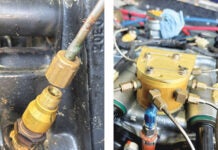 We’re working on an interview with some battery experts, and this is your chance to ask the tough questions. Have you wondered if dropping an aspirin in will help recover a dead battery (or was that chicken soup)? Then there’s the story that charging a battery with it on a concrete floor is a bad idea. Really?
We’re working on an interview with some battery experts, and this is your chance to ask the tough questions. Have you wondered if dropping an aspirin in will help recover a dead battery (or was that chicken soup)? Then there’s the story that charging a battery with it on a concrete floor is a bad idea. Really?
Some of the questions we’ve thought of are below. Send us yours and if we use it, you’ll get the credit for asking.
- Why are aircraft batteries so expensive?
- Besides Gill and Concorde, who makes aircraft batteries?
- What’s the story of these batteries that have multi-cylinders for sides?
- Why does a car battery last so much longer than an aircraft battery?
- Are Li-ion (lithium-ion) batteries suitable for aircraft?
- Is there an easy way to know which batteries should never be run to flat?
- What’s the “old” technology vs. the “new”? If we’ve updated the panel, how about the battery?
- Is there a way to recover a dead battery?
- What are the failure modes and how do I avoid them?
- Is a solar-powered trickle charger a good idea?
- How do de-sulfators work (and what’s sulfation)?
- What should I do with the battery if I don’t fly but once a month? I’m not going to pull it out and store it every month, so is there some easy way to care for it that will only cost me 10% of its life?
- Is there really any difference between an auto-parts store battery and an “official” aircraft battery? Can I use the cheaper version in my Experimental airplane?
- Vents, screw-on caps, totally sealed. Why the difference?
- How can I check the condition of the battery if I can’t get a hydrometer sample? See question 14.
- Overcharging is “bad”, but is undercharging any better?
- I left the charger on too long and boiled out the liquid; is it a goner?
- (your question here!)













